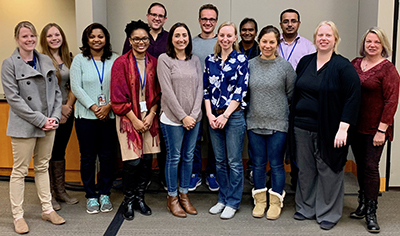The Training Page: NIH Fellows Editorial Board
Influencing Science, One Manuscript at a Time
The NIH Fellows Editorial Board (FEB) recently celebrated a big milestone: They edited their 1,000th submission.
Companies that offer professional editing services often charge hundreds of dollars to review a scientific manuscript. While many early-career researchers benefit from professional editing, logistical and financial challenges make paid services difficult to obtain. Luckily, fellows in the NIH intramural research program and the FDA have a better option—the free editing services offered by the FEB. The FEB is a service for fellows and by fellows that provides free, fast, and confidential editing for grammar, clarity, and flow for a variety of scientific documents including journal articles, book chapters, and grant proposals. Editors highlight confusing sentences, identify where reorganization is needed, and provide suggestions on how to improve overall writing skills. The editors do not, however, consider the scientific merit of manuscripts.

CREDIT: BRANDI CAROFINO, NCI
Members of the Fellows Editorial Board (from left): Amelia Parker, Brianna Daley, Manju Bhaskar, Alexis Carter (consulting member), Iain Sawyer, Brandi Carofino, Lukas Bialkowski, Sarah Deasy, Anowarul Amin, Mariana Mandler, Shailesh Advani, Michelle Saré, and Erika Ginsburg (advisor).
The FEB was founded in 2002 and has edited an average of 60 manuscripts a year for the past 16 years. All editing is performed by fellows who volunteer to serve as board members. The process of editing helps the volunteers to hone their editorial, writing, teamwork, and leadership skills. Prior experience is not required, but new editors are extensively trained by more-senior board members on the principle of “See one, do one, teach one.”
The FEB is currently led by Senior Editor Brandi Carofino (National Cancer Institute, NCI). Each submission is managed by one of four associate editors, a team that currently includes Anowarul Amin and Manju Bhaskar (both from the National Institute of Neurological Disorders and Stroke) and Iain Sawyer and Sarah Deasy (both from NCI). The rest of the board includes 25 editors—representing nearly all the NIH institutes and centers as well as the FDA—who are postdocs, postbacs, and consulting members.
Each submission is managed by an associate editor, who solicits three or four primary editors from the board to lead the discussion during the weekly FEB meeting. Although all board members are encouraged to participate in discussions, primary editors are responsible for carefully reading and editing a submission and serve as the primary contributors during the meeting. In-depth discussion of all submissions is accomplished through a physical meeting in Bethesda and videoconferencing to connect with an ever-growing cohort of remote editors at locations including the NCI at the Shady Grove Campus (Rockville, Maryland), NCI at Frederick Fort Detrick Campus (Frederick, Maryland), the Advanced Technology Research Facility at the National Institute of Environmental Health Sciences (Research Triangle Park, North Carolina), and the Bayview Campus (Baltimore).
After each FEB meeting, primary team members each prepare a report for each submission. The reports are then compiled into a single document so that the reviews are comprehensive but not redundant. The process helps newer editors gain experience under the supervision of more practiced editors. The senior editor finalizes the reports; each author receives a letter that summarizes the board’s overall impressions and a copyedited PDF version of the document. PDF annotation ensures that authors consider the rationale for the edits as they incorporate them into their final document. It’s an educational exercise for the authors as well as the editors. Generally, the authors receive reports within 10 business days and may also request an in-person meeting with the editors if desired.
To evaluate and enhance the service provided by the FEB, authors are asked to complete a feedback form for each submission. The FEB frequently receives the highest marks for each query, which includes questions on timeliness, clarity, helpfulness, and likelihood of submitting future manuscripts to the FEB. FEB-edited manuscripts have recently been published in high-impact journals such as Nature Communications, The Proceedings of the National Academy of Science, Cancer Cell, and The Journal of Biological Chemistry.
Many members use the FEB as a springboard to begin careers as professional science writers or editors. FEB alumni currently hold positions at the Lancet, the Drug Information Association, Ripple Effect Communications, the Susan G. Komen organization, and several NIH institutes. A recent alumna, Caeul Lim (National Institute of Allergy and Infectious Diseases), now an assistant editor at Cell Press in Boston, said that her “experience with the FEB was instrumental in getting the position.”
The FEB is supported by the NCI Center for Cancer Training’s Office of Training and Education. For more information on how to submit or become a member, visit the FEB website at https://ccr.cancer.gov/training/trainee-resources/editorial-board or email NCIeditors@nih.gov.
This page was last updated on Tuesday, April 5, 2022
